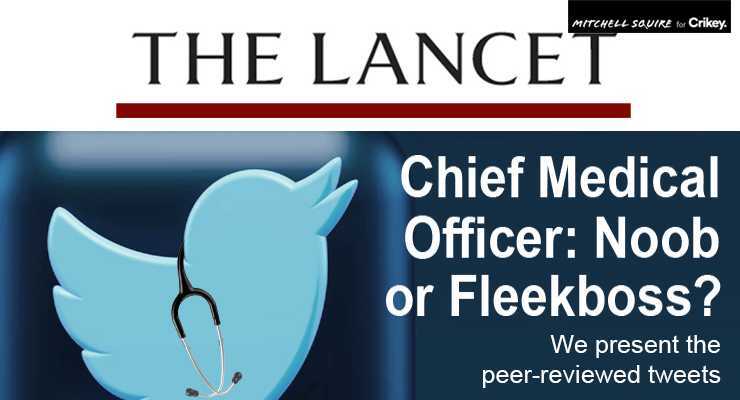
When it comes to COVID-19, which expert should you believe?
Epidemiologists, chief health officers and infectious disease specialists are asked daily for their opinion on lockdowns, vaccines, restrictions and outbreak predictions. While some struggle with their newfound fame, others take to it like a duck to water, amassing huge numbers of social media followers and using their very public platform to disagree with other academics.
Much like politics, there’s a factional divide between experts, some erring on the side of caution and others pushing for optimism and greater freedom. The result: healthy public debate has turned into something nastier, creating even more confusion on who to trust during a period of uncertainty.
Where are the fault lines?
Divides have emerged between OzSage, a group of doctors and academics lobbying the government for COVID action, and former deputy chief medical officer Dr Nick Coatsworth, who now works as an infectious disease physician for Canberra Health Services.
In the AFR today, Coatsworth is reported to have said he had previously warned colleagues that the OzSage group was living in an “alternative reality”.
Executives of the group include biosecurity expert and UNSW Professor Raina MacIntyre, Melbourne University’s school of population and global health head Nancy Baxter, and economist and Crikey contributor Richard Holden. Members include former independent MP and medical practitioner Kerryn Phelps, the Grattan Institute’s Stephen Duckett, the Australian Medical Association’s Nick Talley and microbiologist Brendan Crabb.
Phelps has been targeted on social media by Coatsworth. Responding to a video of her on Twitter raising concerns about unvaccinated kids going back to school during the outbreak, Coatsworth told his near 19,000 followers to “Ignore this woman”, later arguing remote learning should be “resisted by Australian parents”.
On New Year’s Day, he wrote a bold piece in The Sydney Morning Herald: “In 2022, the COVID-19 pandemic will end. The case for fear of COVID-19 is now restricted largely to the social media platform of Twitter.”
Three days later, Phelps responded in Guardian Australia: “The only example Australia is providing to the world now is a warning about what not to do with the COVID-19 pandemic.”
Public spats are nothing new. Premiers have gone head-to-head with the Morrison government, and former Queensland chief health officer Jeannette Young was both praised and criticised for her doomsday take on the AstraZeneca vaccine.
Who’s right and who’s wrong?
OzSage has taken a particularly cautious approach to the pandemic. Given how broad its panel of experts are, this makes sense. Disability advocates are concerned about the effect of outbreaks on the immunocompromised and those unvaccinated for medical reasons; disaster response experts are concerned about hospital surge capacity; offender health experts are concerned about prison outbreaks and human rights violations … the list goes on.
Predictions have often been wrong, downplaying or emphasising the dangers of the disease. Modelling and predictions are tough, given the virus is a moving beast and outcomes vary based on social restrictions, superspreader events and compliance to those rules. But mistakes have been made on all sides.
MacIntyre has drawn criticism for her predictions. In February 2020 she said 400,000 Australians could die from COVID — an estimation that would be true if COVID was 20 times more fatal than it is. In December 2020 she warned NSW cases could jump to 3000 in a fortnight after the Sydney northern beaches outbreak, instead of 220.
Coatsworth similarly said lockdowns could be avoided once 50% of the population had been fully vaccinated (even without Omicron, this was an optimistic prediction at odds with national cabinet modelling). He also said in this current outbreak that modelling showing NSW would have more than 25,000 cases a day was “not accurate”. (NSW this morning recorded 34,759 new cases.)
What effect is this having?
Amid long lockdowns and mental health concerns, Victoria and the federal government were slow to tell Australians what a pathway to freedom would look like. Even two years in, rules aren’t clear with the government flip-flopping on PCR versus rapid antigen tests, close contact definitions, and states reversing rules on restrictions, fuelling confusion and mistrust.
Experts are receiving a high amount of abuse. One October study found 20% of surveyed public scientists had received threats of physical or sexual violence.
Twitter wars might be good for an expert’s exposure, but social media attacks in a time of uncertainty are not something the public needs to see.
Is online information from health experts confusing or clarifying for you? Let us know your thoughts by writing to letters@crikey.com.au. Please include your full name if you would like to be considered for publication in Crikey’s Your Say column. We reserve the right to edit for length and clarity.








Crikey is committed to hosting lively discussions. Help us keep the conversation useful, interesting and welcoming. We aim to publish comments quickly in the interest of promoting robust conversation, but we’re a small team and we deploy filters to protect against legal risk. Occasionally your comment may be held up while we review, but we’re working as fast as we can to keep the conversation rolling.
The Crikey comment section is members-only content. Please subscribe to leave a comment.
The Crikey comment section is members-only content. Please login to leave a comment.